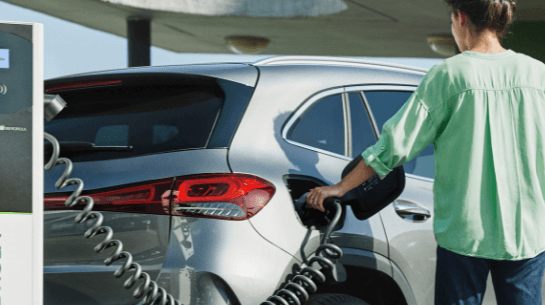
Neoenergia closes deal with WEG to provide recharging stations for electric vehicles
Neoenergia provides solutions in recharging infrastructure for home, business and company clients which aim for electrification of their fleet.
Neoenergia has signed a contract with WEG and shall exclusively use recharge stations of the Brazilian manufacturer for all its electric mobility solutions. Recharge stations for electric vehicles offered in the partnership are of the WEMOB line (WEG Electric Mobility), developed and manufactured nationally. All models have energy gauges and are smart, with an open communication protocol, internet connection and recharge management platforms.
The partnership is in line to the commitments of Neoenergia with sustainable development, stimulating the local production chain and electric mobility, in order to foster efficient decarbonization of the economy and fighting climate change. “With WEG, we are demonstrating our actions to stimulate national production, generating jobs and income to the country. This is a strategic partnership, with a company that addresses all technical requirements and has vast experience and credibility in the market", states the director of Neoenergia Liberalized Businesses, Hugo Nunes.
Electric mobility solutions of Neoenergia are aimed at home clients, businesses and companies that aim to electrify their fleet. Solutions available address various applications, with products of different configurations as per client needs, including a technical review and installation that may be requested on website www.neoenergiacomercializacao.com.br .
Electric mobility solutions of the company are present in eight states - São Paulo, Rio de Janeiro, Bahia, Sergipe, Alagoas, Pernambuco, Paraíba and Rio Grande do Norte - and in the Federal District, and soon on a national level.
Recharge stations with 7.4 kW of power are provided, which may be powered by single-phase or two-phase grids (127 or 220V). This is the ideal model for houses or condominiums. “The use of proper chargers provides safety for people and vehicles, in addition to recharging efficiency", explains Hugo Nunes.
There are also 22 kW power chargers. These points have one or two outlets and may recharge two electric vehicles simultaneously. With a 220V or 380V three-phase feed, this is intended for individual or shared use in companies or businesses. Both models operate with a type 2 connector, the most common in the market.
The Solution Ecosystem includes, in additon to recharge stations, a management platform for billing or apportioning consumption for each user, access controlled via proximity cards (RFID tags) and demand control system - WEMOB Smart Charging System - for cases in which power consumed by the station exceeds the demand contracted at the installation site.
“Our partnership with Neoenergia seeks to foster and empower projects referring to solutions for recharging electric vehicles and business models related to sustainable energy solutions. Not only we strive to advance our strategy to turn electric mobility not only a reality in Brazil, but also structurally address the entire chain required for enabling electric vehicles", explains Manfred Peter johann, Superintendent Officer of Weg Automação.
Sustainable mobility
The sales of electric vehicles between January and October of this year have increased 74% regarding the same period last year, reaching over 27 thousand units. In face of these numbers, the Brazilian Electric Vehicle Association (ABVE) forecasts that plate registrations surpassed 30 thousand units in 2021, a record.
To stimulate this increase, Neoenergia invests in amplifying the recharge infrastructure. The company implemented the Green Corridor, an electric road with over 1,100 kilometers of extension between Bahia and Rio Grande do Norte, with over 18 recharge points, with twelve of those along the highways and six located inside malls located on Salvador, Recife e Natal. The project is part of the program for Research and Development (R&D), regulated by the Agência Nacional de Energia Elétrica (Aneel).
The Green Corridor is one of the initiatives of the Sustainable Mobility Plan from Iberdrola, Neoenergia's parent company. The program also includes recharge solutions offered by the energy trading company. These initiatives are also in line with the decarbonation policies promoted by the group all over the world, in order to fulfill its commitment to the Sustainable Development Goals (SDG) of the United Nations, particularly by fighting climate change (SDG 13). As opposed to combustion-powered vehicles (gasoline, ethanol and diesel oil), electric vehicles do not release greenhouse gases.
In addition, electric vehicles mah represent up to a 70% saving in the value of the traveled kilometer in relation to gasoline. Consumers may decrease their cost even more by installing solar panels at home or at business points, another solution provided by Neoenergia. With photovoltaic generation, it is possible to reduce energy bills up to 95%.
News
2025-10-03
Neoenergia amplia participação na hidrelétrica Corumbá III
2025-09-24
Neoenergia renova parceria com o COB até 2028 e reforça compromisso com o esporte olímpico, a inclusão feminina e a sustentabilidade
2025-09-24
Iberdrola investirá 58 bilhões de euros até 2028 (+30%) para acelerar o crescimento em redes nos EUA e Reino Unido
2025-09-23
MME prorroga contrato de concessão da Neoenergia Pernambuco até 2060
2025-09-18
